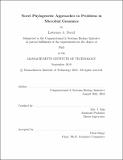Novel phylogenetic approaches to problems in microbial genomics
Author(s)
David, Lawrence A. (Lawrence Anthony)
DownloadFull printable version (18.83Mb)
Other Contributors
Massachusetts Institute of Technology. Computational and Systems Biology Program.
Advisor
Eric J. Alm.
Terms of use
Metadata
Show full item recordAbstract
Present day microbial genomes are the handiwork of over 3 billion years of evolution. Comparisons between these genomes enable stepping backwards through past evolutionary events, and can be formalized using binary tree models known as phylogenies. In this thesis, I present three new phylogenetic methods for gaining insight into how microbes evolve. In Chapter 1, I introduce the algorithm AdaptML, which uses strain ecology information to identify genetically- and ecologically-distinct bacterial populations. Analysis of 1000 marine Vibrionaceae strains by AdaptML finds evidence that niche adaptation may influence patterns of genetic differentiation in bacteria. In Chapter 2, I introduce the algorithm AnGST, which can infer the evolutionary history of a gene family in a chronological context. Analysis of 3968 gene families drawn from 100 modern day organisms with AnGST reveals genomic evidence for a massive expansion in microbial genetic diversity during the Archean eon and the gradual oxygenation of the biosphere over the past 3 billion years. Lastly, I introduce in Chapter 3 the algorithm GAnG, which can construct prokaryotic species trees from thousands of distinct gene trees. GAnG analysis of archaeal gene trees supports hypotheses that the Nanoarchaeota diverged from the last ancestor of the Archaea prior to the Crenarchaeota/Euryarchaeota split.
Description
Thesis (Ph. D.)--Massachusetts Institute of Technology, Computational and Systems Biology Program, 2010. This electronic version was submitted by the student author. The certified thesis is available in the Institute Archives and Special Collections. Cataloged from student-submitted PDF version of thesis. Includes bibliographical references (p. 117-126).
Date issued
2010Department
Massachusetts Institute of Technology. Computational and Systems Biology ProgramPublisher
Massachusetts Institute of Technology
Keywords
Computational and Systems Biology Program.